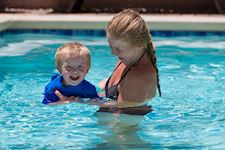Swimming For Babies 24 To 36 Months Old
Skill Success
Summary
- Certificate of completion - Free
- Tutor is available to students
Overview
This course includes lifetime access so you can complete it at your own speed.
This course is designed for those interested to learn the basics of teaching toddlers how to swim, the different ways to hold them, and the best activities for toddlers to learn swimming.
Benefits of taking this course include:
- Unlimited and lifetime access to the course
- Learn the course at your own pace
- Course can be accessed on any platform
- 24/7 Customer support
Course media
Description
These are some of the questions that people always ask us.
- Why do we need to start swimming lessons at such an early age?
- What is the best age for them to start swimming lessons?
- How is this supposed to work if babies can’t understand instructions?
- Does this help babies in their swimming education or it is just a fun time in the water?
Well, first of all, water is a wonderful environment for babies as they were created in very similar conditions. Babies also have limited movements on land due to a weak and developing muscular system; however, they can move freely in the water, which will speed their growing process.
It is also very important to understand that play is the best way for babies to learn; they love wandering around and discovering their surroundings with tasting, touching and playing. It is true that they don't understand most of the verbal instructions. However, they respond to conditioning and in these classes, we educate parents about how to make this happen.
After many years of experience, we can now agree that children who start their swimming education with babies and toddlers swimming backgrounds perform much better than those who are new to swimming. Swimmers with this background tend to have magnificent water familiarisation, buoyancy, and mobility skills. This means they enjoy swimming lessons much more than others with no background.
Who this course is for:
- Parents
- Infant instructors
- Swimming instructors
- Swim School owners and coordinators
- Those interested in teaching toddlers how to swim
Swimming For Babies 24 To 36 Months Old will cover the following topics:
Section 1 - Introduction
- Welcome
- Course Structure
Section 2 - Philosophy
- General Questions
- Philosophy
- Parent And Child Relationship
Section 3 - How To Hold The Baby
- Cradle Hold
- Carry Hold
- Protective Or Hello World Hold
- Hip Or Side Hold
- The Extended Face To Face Hold
- The Extended Facing Away Hold
- Head On The Shoulder Back Hold
- Back Hold
- Kick Hold
Section 4 - Student Needs
- Water Quality
- Water Familiarization, Buoyancy And Mobility
- What You Need Before You Start
Section 5 - Class Structure For Toddlers 24 To 36 Months
- Safe Entry
- Humpty Dumpty
- Crocodile
- Tunnel Activity
- Tunnel And Kick
- Running Off The Mat
- Swim To From Parent
- Swim With Noodle
- Swim To The Toy
- Starfish Or Pancake
- Goodbye – Kids In The Pool
- Safe Exit
Who is this course for?
This course is designed for those interested to learn the basics of teaching toddlers how to swim, the different ways to hold them, and the best activities for toddlers to learn swimming.
Requirements
No prior knowledge is required to take this course.
Career path
None
Questions and answers
Currently there are no Q&As for this course. Be the first to ask a question.
Certificates
Certificate of completion
Digital certificate - Included
Reviews
Currently there are no reviews for this course. Be the first to leave a review.
Legal information
This course is advertised on reed.co.uk by the Course Provider, whose terms and conditions apply. Purchases are made directly from the Course Provider, and as such, content and materials are supplied by the Course Provider directly. Reed is acting as agent and not reseller in relation to this course. Reed's only responsibility is to facilitate your payment for the course. It is your responsibility to review and agree to the Course Provider's terms and conditions and satisfy yourself as to the suitability of the course you intend to purchase. Reed will not have any responsibility for the content of the course and/or associated materials.


